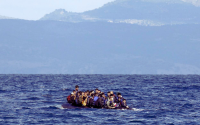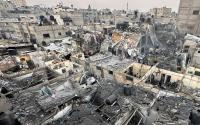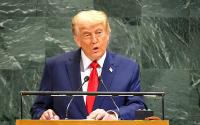Young icons of death who warn the world of the rise of Hamas
30 June 2002Peter Beaumont
The boy from Hamas came walking down the alley with a shopping bag dangling from one hand. His destination was the Gaza City home of Sheikh Ahmed Yassin, spiritual leader of the Islamist militant group and the man behind a spate of suicide bombing attacks against Israel.
He looked about 12 years old, a slightly chubby kid with the big self-conscious grin of someone on an important mission. From his bulging bag he brought out a small, sleek pipe bomb with a thermite fuse - a home-made grenade - newly minted in a nearby workshop - and showed it to the Hamas men guarding Yassin's house. They passed it admiringly around.
And then the boy went on his way, one more anonymous youngster running the first errands of a future fighter.
Last week another 'child of Hamas' was splashed across the front pages of the world's media: an unnamed toddler from a village south of the West Bank city of Hebron, the son of a senior Hamas activist on the run from Israeli forces.
Someone had wrapped his head in the red bandanna of Hamas's military wing and strapped a make-believe suicide bomb harness to his body.
Then they photographed him - for a joke, say relatives - and put the picture in the family album. On Friday that picture, seized by Israel's army, was presented as the latest evidence of what, the Israelis will tell you, is the illness in Palestinian society: the continuing sickness that encourages suicide bombing.
But the message of the picture is one that Israel seems determined to ignore. Like the boy with the pipe bombs in Gaza City, the picture speaks of the inexorable rise in popularity of Hamas, a movement that rejects the two-state solution advocated by the Palestinian Authority, and is dedicated to Israel's destruction.
As Ariel Sharon and Israel's armed forces have violently dismantled the institutions and physical infrastructure of the Palestinian Authority one has remained intact - and that is Hamas.
Its preachers lead prayers in the mosques. Its workers and charities organise help for the most impoverished and for the families that have lost their men and boys to the intifada.
Above all, it is Hamas's suicide bombers that have been at the forefront of 71 lethal attacks. And it is to Hamas that Palestinan society is turning as it becomes more radicalised, rejecting Yasser Arafat and his Fatah movement in growing numbers.
Support for suicide bombings in Palestinian society is running above 60 per cent.
More than 80 per cent reject the arrest of those ordering the suicide operations. At the same time Hamas has seen its popular support double - up to 25 per cent in the West Bank and perhaps as high as 30 per cent in Gaza - to the point where for the first time it could offer a credible challenge to Arafat and Fatah.
The only candidate so far to declare himself against Arafat for next year's presidential elections is Abdu Sattar Kasseem, a lecturer at An-Najah university in Nablus, a Hamas stronghold. While not Hamas himself, his critique of Arafat is one that Hamas would not reject. It is a message that has not been lost on Arafat, as his Ramallah headquarters remain surrounded by Israeli tanks. Last week, under pressure from Israel, Arafat ordered the arrest of leading Hamas activists on the Gaza Strip. It was a move condemned even by senior Fatah officials from his own movement.
We met Abbas Zaki in Hebron last week, trapped in his home by Israel's military incursion into the city, which, late on Friday, saw the Israelis end a four-day seige of its hilltop police headquarters with two massive explosions that left a smouldering pile of rubble.
Zaki, a member of the Palestinian Legislative Council and a senior Fatah official, reflects the growing disenchantment with the leadership in Ramallah.
'I don't agree with what was done to the Hamas leadership in Gaza. It is like going to war against ourselves. We must have unity, not division. That is not good for the Palestinian cause. Hamas is popular,' he says emphatically. 'If you put them under house arrest you are not Palestinian.'
Worryingly for Arafat, Zaki adds: 'What is needed is a new kind of resistance movement to lead the struggle.'
The rise in popularity of Hamas has also been noted with worry by European diplomats who fear that far from uprooting terrorism, and the scourge of the suicide bomber, Israel and the United States' joint policy of isolating Arafat and dismantling his institutions is making the suicide bombers stronger.
'The turning point was Arafat's agreement in April to allow the fighters trapped in the Church of the Nativity in Bethlehem in April to be deported into exile,' said one diplomatic source last week. 'For many Palestinians that... was regarded as a major betrayal.'
And Hamas has been the biggest beneficiary. 'The way things are going,' he adds, 'there is the real danger that Hamas could sweep the board in any local elections if it chooses to stand. President Bush says he wants an alternative Palestinian leadership. If he wants it, he will get it. The only problem is that it will be Hamas.'
Sheikh Ahmed Yassin is sitting in his wheelchair when he receives us. Hamas's spiritual leader is largely paralysed from the neck down, and speaks in a series of high-pitched squeaks that makes his message seem somehow more sinister.
'The Palestinian leadership,' he tells us, 'has given up or capitulated in full to Israeli demands. Their demands never come to an end. The Hamas movement has its own principles and it will continue until the fulfilment of its own goals.
'Ask the Israelis how they have been affected by Hamas's military operations. Ask them about the damage to Israel's economy. Ask how the operations are strangling Israeli society, how it has put them under threat where they live.'
I ask him about Arafat's order to end suicide bombings and place him under house arrest. Is this a betrayal?
'From the beginning the Palestinian Authority has taken the wrong road. When the Palestinian Authority releases statements condemning suicide bombings to win US opinion it is colluding against the Palestinian people.'
And does he condemn suicide attacks that kill children?
'We do not target children,' says Yassin. 'Islamic teaching says that children should not be targeted or killed. We consider this to be a crime.'
So will his organisation refuse to 'accept' martyr operations that kill children? 'We will stop killing their children,' he answers, 'when they stop killing ours.'
So it continues with the coming generation: the child as terrorist; icon of terror, and numbered among the dead.
http://www.observer.co.uk/worldview/story/0,11581,746752,00.html






